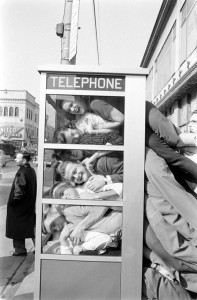Two Kingdoms in a Phone Booth.
 It’s not hard to imagine squeezing a couple of people into a phone booth. In fact, there was a mid-twentieth century nostalgic flare for trying to cram as many people as possible into small spaces like phone boots, cars, and even… outhouses.
It’s not hard to imagine squeezing a couple of people into a phone booth. In fact, there was a mid-twentieth century nostalgic flare for trying to cram as many people as possible into small spaces like phone boots, cars, and even… outhouses.
Have you ever tried it? How many did you cram into what?
Imagine for a moment that you are confined in a small space, like a phone booth, with another person. Imagine as well that this person is a stranger. The possibility of your two worlds colliding, or better yet, two Kingdoms existing simultaneously in the same proximity are pretty good.
For the believer, God “has rescued us from the kingdom of darkness and transferred us into the Kingdom of his dear Son.” (Colossians 1:13) Unbelievers remains in the Kingdom of darkness. These kingdoms often exist side by side and crammed into small spaces. It’s the natural order of things. It’s the needed order of things. Whether they overlap, bounce off each other, effect each other, or simply coexist is difficult to say. Christians have a propensity to talk of “extending” the Kingdom, “expanding it,” and even “taking ground” for it. Admittedly, the language of the Kingdom is a bit difficult to express when it comes to its growth. Lately I’ve been dwelling on the word “envelope.” My wife has suggested that we help others “realize” it. The Kingdom is expanded, extended, and taken, but not so much, in my opinion, by humans. The King does those things. His emissaries, or disciples, represent the King and His Kingdom and are but one of the means God uses to demonstrate and declare it.
When Kingdoms exist in proximity, conflicts arise, ideologies collide, and delineations become clearer. Both are always trying to envelope the other. For most, this is an invisible conflict. The Apostle Paul states:
“But and if our gospel is veiled, it is veiled in them that are perishing: in whom the god of this world hath blinded the minds of the unbelieving, that the light of the gospel of the glory of Christ who is the image of God, should not dawn upon them… Seeing it is God, that said, Let there be light, who shined in our hearts, to give the light of the knowledge of the glory of God in the face of Jesus Christ” (2 Corinthians 4:3-4, 6).
While these kingdoms can exist in proximity, they can never have true fellowship with one another. Again Paul says: “what fellowship can light have with darkness?“(2 Corinthians 6:14-18)
And while the Kingdom of Light can envelop the Kingdom of darkness, it can not, ultimately happen in reverse. The kingdom of darkness can not overcome the Kingdom of Light.
”In the beginning was the Word, and the Word was with God, and the Word was God… In him was life; and the life was the light of men. And the light shineth in the darkness; and the darkness overcame it not” (John 1:1, 4-5).
In order for the Kingdom of light to overcome the Kingdom of darkness, and to move or “transfer” people, we must cooperate with God as He moves out and expands His Kingdom. He is the one who sends us in the manner that Christ was sent. (John 20:21)
When we incarnate or enflesh the Kingdom amongst others there’s collision. As Alan Hirsch says, there are four characteristics of incarnation. Those are presence, proximity, powerlessness, and proclamation. [1]
Presence ~ Jesus did not engage us with ideas alone. He engaged us with his life. We are to be salt & light. Our presence illuminates and preserves.
Proximity ~ The incarnation is literally about the God who came near (proximate). God was made flesh in a specific geographical region. He drew near.
Powerlessness ~ Incarnation brings with it a posture of powerlessness. Philippians 2:7 says that Christ emptied himself taking the form of a servant.
Proclamation ~ Finally, Christ came near for the specific purpose of proclamation: “The Kingdom of God is at hand, repent and be baptized” He is both incarnated logos and bearer of logos (message) He is medium and message. He never separated the two, and neither should we.
So, whether it’s being crammed into small spaces or just coexisting in larger geographical areas, we must constantly remind ourselves of conflicting kingdoms. We must also be aware that these Kingdoms can wage war within us. Through presence, proximity, powerlessness, and proclamation, the church exemplifies God’s story of a King and Kingdom in the life, death, resurrection, ascension, and coronation of His Son. He sends ambassadors who represent Him and call others to turn our hearts to Him. As a church incarnated in the community or crammed into a telephone booth, you should also be a people who announce and demonstrate the reign of Christ. A few questions:
1. What verbs would you use to describe the human element in the “expansion” of the Kingdom?
2. What adjectives would you use to describe the Kingdom?
3. If someone were to ask you, “What is the Gospel of the Kingdom?” and you only had a 10 seconds to give an answer, what would you say?
[1] Alan Hirsch. Forgotten Ways, The: Reactivating the Missional Church (p. 133 & following). Kindle Edition.













 Related StoriesEphesians 4:11 – Who’s Sent?Discipleship Group – We’re Going Mobile!Leading Edge Missiology and Ecclesiology?
Related StoriesEphesians 4:11 – Who’s Sent?Discipleship Group – We’re Going Mobile!Leading Edge Missiology and Ecclesiology?



